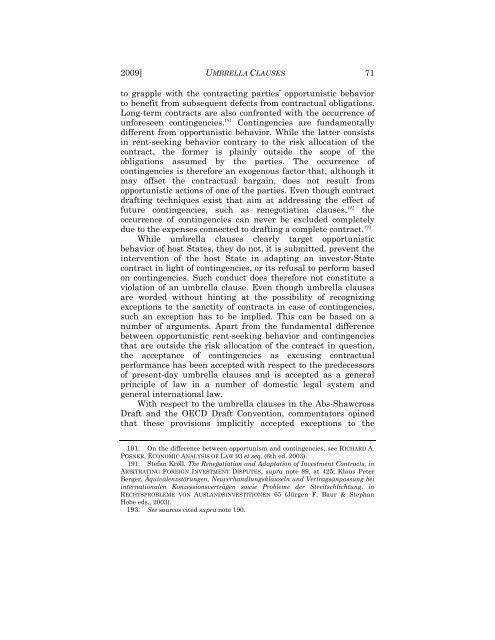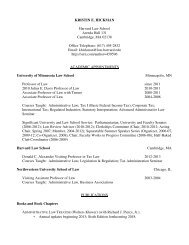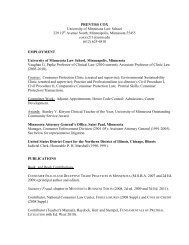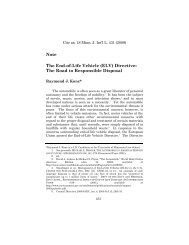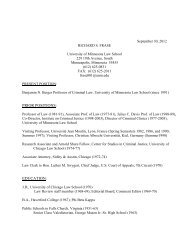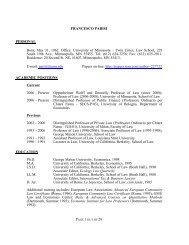Enabling Private Ordering - the University of Minnesota Law School
Enabling Private Ordering - the University of Minnesota Law School
Enabling Private Ordering - the University of Minnesota Law School
Create successful ePaper yourself
Turn your PDF publications into a flip-book with our unique Google optimized e-Paper software.
2009] UMBRELLA CLAUSES 71<br />
to grapple with <strong>the</strong> contracting parties’ opportunistic behavior<br />
to benefit from subsequent defects from contractual obligations.<br />
Long-term contracts are also confronted with <strong>the</strong> occurrence <strong>of</strong><br />
unforeseen contingencies. 191 Contingencies are fundamentally<br />
different from opportunistic behavior. While <strong>the</strong> latter consists<br />
in rent-seeking behavior contrary to <strong>the</strong> risk allocation <strong>of</strong> <strong>the</strong><br />
contract, <strong>the</strong> former is plainly outside <strong>the</strong> scope <strong>of</strong> <strong>the</strong><br />
obligations assumed by <strong>the</strong> parties. The occurrence <strong>of</strong><br />
contingencies is <strong>the</strong>refore an exogenous factor that, although it<br />
may <strong>of</strong>fset <strong>the</strong> contractual bargain, does not result from<br />
opportunistic actions <strong>of</strong> one <strong>of</strong> <strong>the</strong> parties. Even though contract<br />
drafting techniques exist that aim at addressing <strong>the</strong> effect <strong>of</strong><br />
future contingencies, such as renegotiation clauses, 192 <strong>the</strong><br />
occurrence <strong>of</strong> contingencies can never be excluded completely<br />
due to <strong>the</strong> expenses connected to drafting a complete contract. 193<br />
While umbrella clauses clearly target opportunistic<br />
behavior <strong>of</strong> host States, <strong>the</strong>y do not, it is submitted, prevent <strong>the</strong><br />
intervention <strong>of</strong> <strong>the</strong> host State in adapting an investor-State<br />
contract in light <strong>of</strong> contingencies, or its refusal to perform based<br />
on contingencies. Such conduct does <strong>the</strong>refore not constitute a<br />
violation <strong>of</strong> an umbrella clause. Even though umbrella clauses<br />
are worded without hinting at <strong>the</strong> possibility <strong>of</strong> recognizing<br />
exceptions to <strong>the</strong> sanctity <strong>of</strong> contracts in case <strong>of</strong> contingencies,<br />
such an exception has to be implied. This can be based on a<br />
number <strong>of</strong> arguments. Apart from <strong>the</strong> fundamental difference<br />
between opportunistic rent-seeking behavior and contingencies<br />
that are outside <strong>the</strong> risk allocation <strong>of</strong> <strong>the</strong> contract in question,<br />
<strong>the</strong> acceptance <strong>of</strong> contingencies as excusing contractual<br />
performance has been accepted with respect to <strong>the</strong> predecessors<br />
<strong>of</strong> present-day umbrella clauses and is accepted as a general<br />
principle <strong>of</strong> law in a number <strong>of</strong> domestic legal system and<br />
general international law.<br />
With respect to <strong>the</strong> umbrella clauses in <strong>the</strong> Abs-Shawcross<br />
Draft and <strong>the</strong> OECD Draft Convention, commentators opined<br />
that <strong>the</strong>se provisions implicitly accepted exceptions to <strong>the</strong><br />
191. On <strong>the</strong> difference between opportunism and contingencies, see RICHARD A.<br />
POSNER, ECONOMIC ANALYSIS OF LAW 93 et seq. (6th ed. 2003).<br />
191. Stefan Kröll, The Renegotiation and Adaptation <strong>of</strong> Investment Contracts, in<br />
ARBITRATING FOREIGN INVESTMENT DISPUTES, supra note 89, at 425; Klaus Peter<br />
Berger, Äquivalenzstörungen, Neuverhandlungsklauseln und Vertragsanpassung bei<br />
internationalen Konzessionsverträgen sowie Probleme der Streitschlichtung, in<br />
RECHTSPROBLEME VON AUSLANDSINVESTITIONEN 65 (Jürgen F. Baur & Stephan<br />
Hobe eds., 2003).<br />
193. See sources cited supra note 190.


